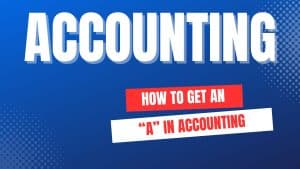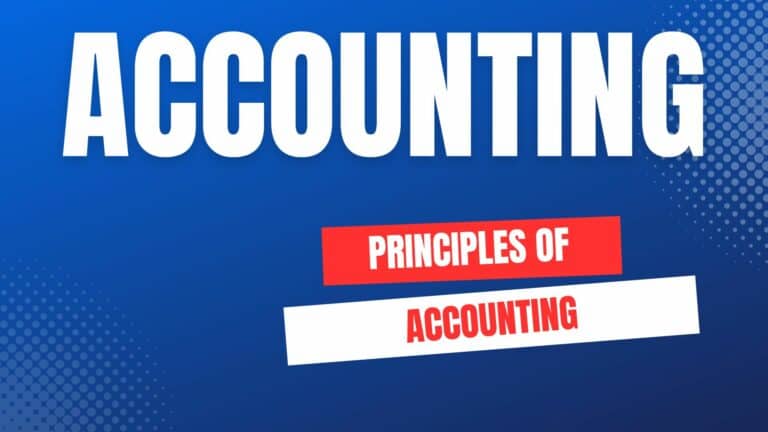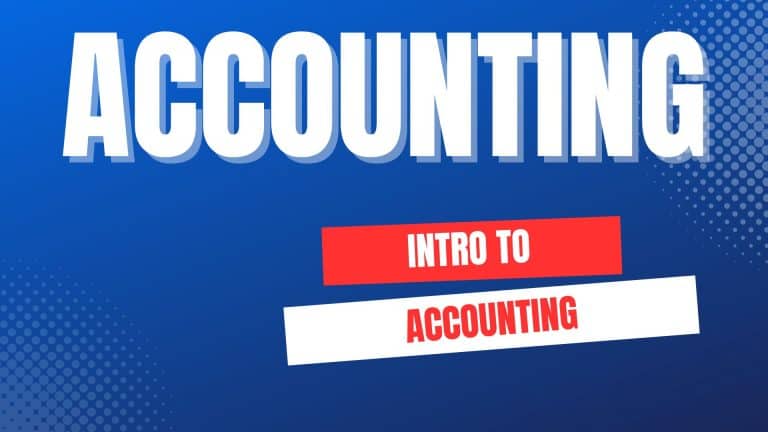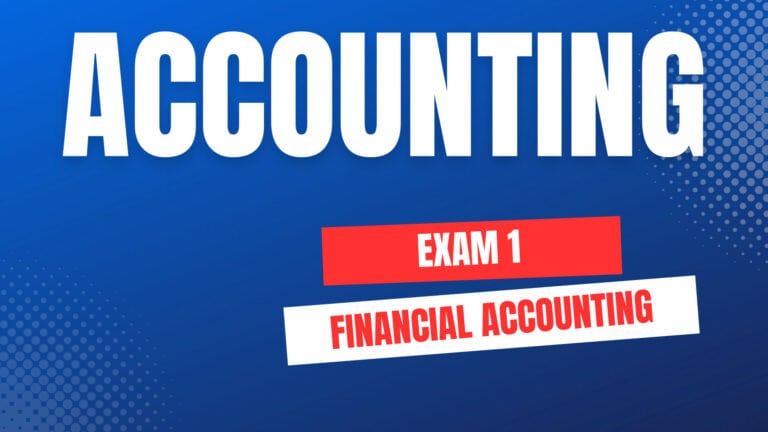Studying accounting can be intimidating. Accounting is the first business course for many college students. It is a difficult and challenging subject.
Here are the top 10 tips to make an A in accounting.
This is Chapter 1 in Financial Accounting. This chapter includes:
- Introduction to Accounting
- 10 Tips to Make an A in Accounting
- Accounting Concepts
- Accounting Careers and Certifications
- Introduction to Accounting YouTube playlist
For all the chapters, see The Ultimate Guide to Learn Accounting
Contents
How to make an A in accounting
Students always ask what they can do to succeed in accounting. Here are my top 10 tips to make an A in accounting class.
1. Know the expectations
Know what the professor expects and what is required on the syllabus. Accounting is a challenging subject, and you must work hard to make a good grade.
Make sure you know the deadlines for homework and assignments. Set your own deadlines so you can work ahead of when they are due. You will have much more time to complete your work, and you will also have time for questions.
2. Be an active learner
Teach yourself by asking questions. Quiz yourself to see if you remember concepts and how to solve problems. Make it a game to make sure you know the accounting material.
Make flashcards to carry with you. If you have 10 extra minutes, instead of checking your phone, review your flashcards.
Be prepared every day to come to class, listen, and take notes.
To make an A in accounting, be an active learner. Work lots of problems.
3. Participate in every class
Arrive 5 minutes early so you can be ready when the class starts. Answer questions that your professor asks. Ask questions if you do not understand. Good questions are the key to learning. Don’t be afraid to speak up if you don’t understand.
Before class starts, get out your pen or pencil and notebook. You know you will need it. Don’t wait until the professor starts to get your tools out. You are already behind if you wait.
You should bring a financial calculator to class every day. A financial calculator is a great tool for any business student. Have your calculator out so you can make quick calculations in class. This is active learning!
Put away your phone and put it in silent mode in class. Even better, put your phone in airplane mode. You don’t want to be distracted while you are in focus mode. You need your attention to learn the material, so you can take good notes and ask questions.
4. Take good notes
For most students, taking notes with a pen and paper is better than using a computer. It is simpler to draw a diagram or formula by hand than with a computer. Computers are distracting, both to you and to your classmates.
Find a good system to take notes, and then use that system. Cornell Notes is an excellent system for accounting. You should have plenty of space to add notes or summaries later.
Tip: You can take class notes with a pen or pencil, but if you have an in-class exam, make sure you bring pencils and an eraser.
When you begin class each day, put the date on the top of your paper. This will help you see what is covered each day and how many days you covered similar topics. You can also compare your notes with friends to see if you missed anything.
5. Study your notes and textbook
Now that you have a good set of notes, you need to review them. You should plan on going over your notes almost every day. If you want to learn, you will spend some time every day learning the material. When you study, try to rework the problems you worked on in class or on homework.
Don’t forget to read your textbook! There is a lot of information that will help your understanding. Focus on how the new material connects to what you already know. The more you study, the more you will learn!
6. Work lots of problems
Work on lots of problems, and then work on more problems. You should work enough problems so you are confident in your understanding. Ask your professor if you can do extra problems or if solutions are available for problems in each chapter.
Accounting is a subject with lots of problems, journal entries, and financial statements. You need to solve all types of problems.
You will need a financial calculator to solve financial problems. See The Best Financial Calculator for accounting and finance students.
It takes hard work to make an A in accounting. Nothing worthwhile is easy.
We always have a choice between the easy and the hard. An F is easy. An A is hard. Hard work is worth it.
7. Study with friends and teach each other
You should make friends in your class. If you miss a class, you can ask them for their notes. You should plan to study with friends in class. Practice trying to explain a concept or problem, and you will find out if you know it. If you want to learn a subject, try to teach it to someone else.
A benefit of having friends is that they hold you accountable for being in class and sharing your notes. Also, you learn the important business skill of networking. Your friends in class may work for a company that you like, and you already have a contact!
8. Pursue learning and not grades
Of course you want to make an A in accounting, but grades are not as important as you think they are. It seems so important when you are in college. In fact, some students only focus on how to get a specific grade.
Do not let grades interfere with your learning. Developing a good work ethic is better than getting good grades.
Learning how to work hard is the real benefit of school. If you work hard, your grades will usually be good. Do more than what is asked of you. Memorization is not enough to do well.
Understand why and how. Be curious, and keep asking questions. If you really learn accounting, your grade will be fine.
“It’s not the will to win that matters– everyone has that. It’s the will to prepare to win that matters.”
Paul “Bear” Bryant
Estimate how much time you will need to complete an assignment or study for an exam. Now, double that estimate. That is the amount of time you need to schedule in your week in the days before the assignment is due.
Many assignments will take more time than you initially realize. Build extra time into your schedule. If you have extra time, that is good. If you run out of time, your assignment is missed, and your exam grade suffers.
9. Work ahead of schedule and avoid procrastination
If you wait until the last minute, you are setting yourself up for failure. You cannot do well if you are hurrying and if you are stressed. If you wait until the last minute, you will not have enough time for assignments and for studying. You will miss assignments and do poorly on exams.
You should set your own schedule and make your deadlines earlier than your course deadlines. If homework is due on Wednesdays, try to complete it on Mondays.
If an exam is on Friday, set your deadline to finish studying on Wednesday. Do your best to stick to your personal deadline. Your stress level will go way down, and you will have time for a final review and sleep the night before!
10. Develop good habits
Eat, sleep, socialize, study, and exercise on a sustainable schedule. You must develop good habits.
Go to bed and wake up at the same time every day. Plan times to eat and exercise on a normal schedule. Make time for friends in your daily schedule. Make sure you are studying some course material every day.
Limit time on social media, television, videos, and video games. These are great activities, but they can easily take several hours each day.
Turn off automatic next video settings on YouTube, Netflix, and similar streaming services. You want to make the decision to watch the next video, not Netflix or YouTube.
You are going to be on YouTube anyway, so check our our accounting videos Accounting Basics Course for Beginners
Look at your phone report to see how many hours you spend each day on your device. Now, multiply that number by 7. That is how many hours you use your phone each week. This number is shocking!
If you spend 8 hours of your day on your phone, that is over 50 hours. Losing over two days a week to your phone is a tragedy. You need to manage your phone and use your time wisely.
If you spend up to 8 hours per day on your phone, that’s over 50 hours per week, or 2 days of the week.
Bonus 1: Know the financial statements
One of the goals of accounting is to prepare and understand financial statements. You should know the financial statements. The financial statements are:
- Income statement
- balance sheet
- cash flow statement
You should know how everything affects the financial statements. For example, the income statement has all the company’s revenues and expenses. The income statement shows the most recent net income, or profit.
The balance sheet shows all the company’s assets, liabilities (debt), and equity. Every asset and every debt are included on the balance sheet.
Bonus 2: Learn Excel
As a business student, you will need to know how to use Microsoft Excel. Some universities teach specific Excel courses. However, some colleges require Excel assignments in many courses and expect students to learn it on their own.
Unfortunately, many professors assume students already know Excel. Employers also assume that business students know Excel, even during internships.
You need to learn Excel. Learn it as soon as you can.
Here is an Excel tutorial for beginners:
Studying accounting is worth it!
Accounting is the best introduction to business. Accounting is the language of business. This language includes financial data and financial statements. When you are the owner, you want to know all about your business.
Thriving in an accounting course is possible if you have a plan and work hard every day.
With these tips, you are on your way to success in studying accounting and in your business career. Good luck!
Accounting Chapters
Here are the accounting chapters in The Ultimate Guide to Learn Accounting:
- Introduction to Accounting
- Recording Business Transactions
- Adjusting Entries and the Accounting Cycle
- Merchandising Activities
- Inventory and Cost of Goods Sold
- Time Value of Money
- Cash and Internal Control
- Receivables
- Long-Term Assets
- Current Liabilities
- Long-Term Liabilities
- Corporations
- Statement of Cash Flows
- Financial Statement Analysis
- Managerial Accounting
- Job Order Costing
- Process Costing
- Activity Based Costing
- Cost Volume Profit Analysis
- Variable Costing
- Master Budgets
- Standard Costing
- Performance Measurement
- Relevant Costing
- Capital Budgeting
See also Accounting Sample Exams.




